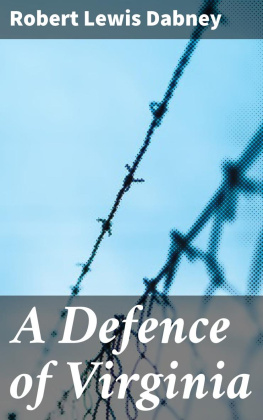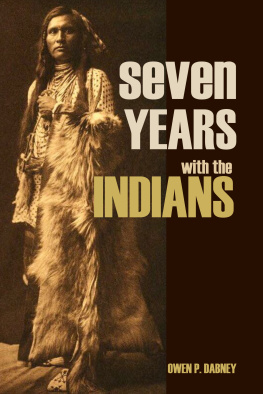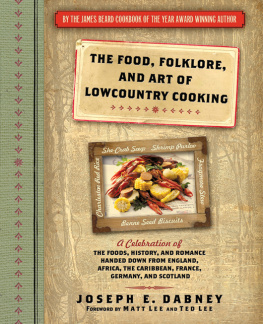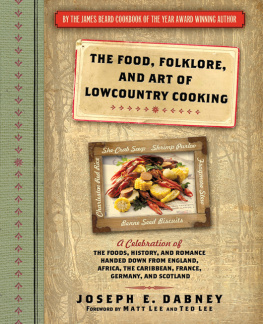Robert Lewis Dabney - A Defence of Virginia
Here you can read online Robert Lewis Dabney - A Defence of Virginia full text of the book (entire story) in english for free. Download pdf and epub, get meaning, cover and reviews about this ebook. year: 2015, publisher: Confederate Reprint Company, genre: Romance novel. Description of the work, (preface) as well as reviews are available. Best literature library LitArk.com created for fans of good reading and offers a wide selection of genres:
Romance novel
Science fiction
Adventure
Detective
Science
History
Home and family
Prose
Art
Politics
Computer
Non-fiction
Religion
Business
Children
Humor
Choose a favorite category and find really read worthwhile books. Enjoy immersion in the world of imagination, feel the emotions of the characters or learn something new for yourself, make an fascinating discovery.
- Book:A Defence of Virginia
- Author:
- Publisher:Confederate Reprint Company
- Genre:
- Year:2015
- Rating:5 / 5
- Favourites:Add to favourites
- Your mark:
- 100
- 1
- 2
- 3
- 4
- 5
A Defence of Virginia: summary, description and annotation
We offer to read an annotation, description, summary or preface (depends on what the author of the book "A Defence of Virginia" wrote himself). If you haven't found the necessary information about the book — write in the comments, we will try to find it.
A Defence of Virginia — read online for free the complete book (whole text) full work
Below is the text of the book, divided by pages. System saving the place of the last page read, allows you to conveniently read the book "A Defence of Virginia" online for free, without having to search again every time where you left off. Put a bookmark, and you can go to the page where you finished reading at any time.
Font size:
Interval:
Bookmark:

| CHAPTER I. |
| Introductory |
| CHAPTER II. |
| The African Slave Trade |
| CHAPTER III. |
| Legal Status of Slavery in the United States |
| CHAPTER IV. |
| History of Emancipation |
| CHAPTER V. |
| The Old Testament Argument |
| The Curse upon Canaan |
| Abraham a Slaveholder |
| Hagar Remanded to Slavery by God |
| Slavery in the Laws of Moses |
| Slavery in the Decalogue |
| Objections to the Old Testament Argument |
| CHAPTER VI. |
| The New Testament Argument |
| Definition of |
| Slavery often mentioned; yet not condemned |
| Christ Applauds a Slaveholder |
| The Apostles Separate Slavery and its Abuses |
| Slavery no Essential Religious Evil |
| Slaveholders fully Admitted to Church-membership |
| Relative Duties of Masters and Slaves Recognized |
| Philemon and Onesimus |
| St. Paul Reprobates Abolitionists |
| The Golden Rule Compatible with Slavery |
| Was Christ Afraid to Condemn Slavery? |
| CHAPTER VII. |
| The Ethical Argument |
| Misrepresentations Cleared |
| The Rights of Man and Slavery |
| Abolitionism is Jacobinism |
| Labour of Another may be Property |
| The Slave Received due Wages |
| Effects of Slavery on Moral Character |
| Slavery and the African Slave Trade |
| The Morality of Slavery Vindicated by its Results |
| CHAPTER VIII. |
| Economical Effects of Slavery |
| Slavery and Republican Government |
| Slavery and Malthusianism |
| Comparative Productiveness of Slave Labour |
| Effects of Slavery in the South, compared with those of Free Labour in the North |
| Effects of Slavery on Population, Disease, and Crime |
| CHAPTER IX. |
| Conclusion |
Font size:
Interval:
Bookmark:
Similar books «A Defence of Virginia»
Look at similar books to A Defence of Virginia. We have selected literature similar in name and meaning in the hope of providing readers with more options to find new, interesting, not yet read works.
Discussion, reviews of the book A Defence of Virginia and just readers' own opinions. Leave your comments, write what you think about the work, its meaning or the main characters. Specify what exactly you liked and what you didn't like, and why you think so.







